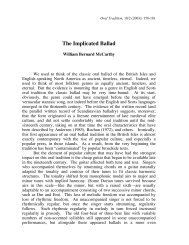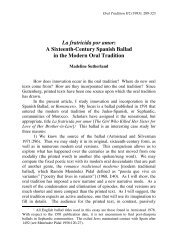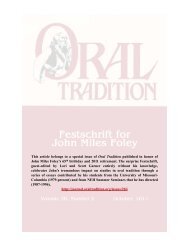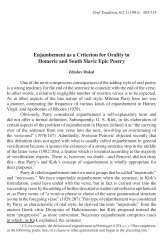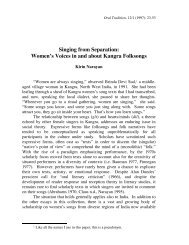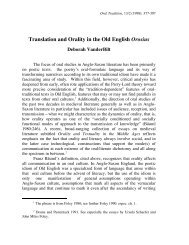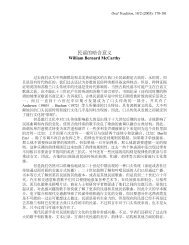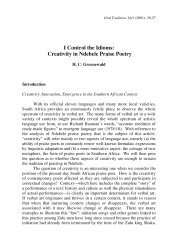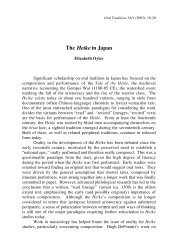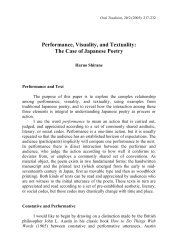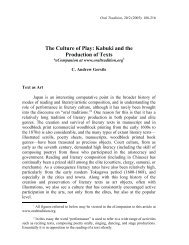Silent Voices: The Role of Somali Women's Poetry in Social and ...
Silent Voices: The Role of Somali Women's Poetry in Social and ...
Silent Voices: The Role of Somali Women's Poetry in Social and ...
You also want an ePaper? Increase the reach of your titles
YUMPU automatically turns print PDFs into web optimized ePapers that Google loves.
Oral Tradition 9/1 (1994): 185-202<br />
<strong>Silent</strong> <strong>Voices</strong>: <strong>The</strong> <strong>Role</strong> <strong>of</strong> <strong>Somali</strong> Women’s<br />
<strong>Poetry</strong> <strong>in</strong> <strong>Social</strong> <strong>and</strong> Political Life<br />
Za<strong>in</strong>ab Mohamed Jama<br />
Oral literature plays a very important role <strong>in</strong> <strong>Somali</strong> culture <strong>and</strong> has<br />
done so for thous<strong>and</strong>s <strong>of</strong> years. <strong>The</strong> <strong>Somali</strong> language is spoken <strong>in</strong> <strong>Somali</strong>a,<br />
Djibouti, the <strong>Somali</strong> regions <strong>of</strong> Ethiopia, <strong>and</strong> the northeastern region <strong>of</strong><br />
Kenya. Before 1972 there was no written script; s<strong>in</strong>ce then, the writ<strong>in</strong>g <strong>of</strong><br />
the <strong>Somali</strong> orthography has not had much effect on the composition <strong>and</strong><br />
dissem<strong>in</strong>ation <strong>of</strong> oral poetry. <strong>The</strong> majority <strong>of</strong> the <strong>Somali</strong>s, largely nomadic<br />
pastoralists, still rema<strong>in</strong> illiterate. Even a literate populace has little<br />
relevance, however, s<strong>in</strong>ce learned poets such as Hadrawi, considered the<br />
best male poet <strong>of</strong> the present generation, cont<strong>in</strong>ue to transmit <strong>and</strong> publicize<br />
their poetry orally. Through their performances before live audiences or<br />
through their record<strong>in</strong>gs <strong>of</strong> poetry on cassette or videotape, the oral<br />
dissem<strong>in</strong>ation process cont<strong>in</strong>ues unabated. <strong>Somali</strong> literature is therefore still<br />
predom<strong>in</strong>antly oral: it is orally composed, memorized, <strong>and</strong> recited.<br />
One cannot adequately summarize here the function <strong>of</strong> oral literature<br />
or poetry <strong>in</strong> the society, because it affects the daily lives <strong>of</strong> most <strong>Somali</strong>s<br />
wherever they are. <strong>Poetry</strong>, proverbs, riddles, <strong>and</strong> other genres are used as<br />
acts <strong>of</strong> communication <strong>and</strong> as a form <strong>of</strong> education (elders to the young).<br />
<strong>The</strong>y play a significant role <strong>in</strong> traditional courts <strong>and</strong> <strong>in</strong> tribal <strong>and</strong> political<br />
affairs.<br />
In times <strong>of</strong> conflict, poets adopt the position <strong>of</strong> journalists,<br />
spokespersons, <strong>and</strong> politicians rolled <strong>in</strong>to one. Poets from different sides <strong>of</strong><br />
the conflict exchange poetry that is performed at assemblies <strong>and</strong> traditional<br />
courts. <strong>The</strong>se poetic compositions are also passed to different settlements<br />
<strong>and</strong> communities by word <strong>of</strong> mouth through the pr<strong>of</strong>essional memorizers<br />
<strong>and</strong> reciters. Proverbs are used <strong>in</strong> everyday verbal exchanges <strong>in</strong> both rural<br />
<strong>and</strong> urban societies. Riddles are more commonly used by nomads, who<br />
cont<strong>in</strong>ue to test each other’s knowledge <strong>and</strong> <strong>in</strong>telligence by present<strong>in</strong>g<br />
complicated oral puzzles to one another. Last but not least, other forms <strong>of</strong>
186 ZAINAB MOHAMED JAMA<br />
oral literature are performed or listened to purely for enterta<strong>in</strong>ment.<br />
In this paper women’s poetry will be exam<strong>in</strong>ed. <strong>Somali</strong> classical<br />
poetry—the type <strong>of</strong> poetry best suited to address issues <strong>of</strong> serious <strong>in</strong>terest—<br />
is divided <strong>in</strong>to four ma<strong>in</strong> styles: Gabay, Geeraar, Jiifto, <strong>and</strong> Buranbur.<br />
Accord<strong>in</strong>g to this classification, based on the way the poem is chanted <strong>and</strong><br />
the rhythmic pattern <strong>of</strong> words, the Gabay, Geeraar, <strong>and</strong> Jiifto are seen as<br />
male genres while Buranbur is considered the female style (Andrzejewski<br />
<strong>and</strong> Lewis 1974).<br />
Dur<strong>in</strong>g the last few years I have been look<strong>in</strong>g at works <strong>of</strong> poetry by<br />
different <strong>Somali</strong> poetesses <strong>and</strong> have concluded that the style adopted by a<br />
poet or a poetess depends on that particular artist. <strong>The</strong>re also seem to be<br />
regional <strong>in</strong>fluences on the artist’s style. For example, women from the<br />
northwestern regions <strong>of</strong> <strong>Somali</strong>a (now <strong>Somali</strong>l<strong>and</strong>) who were <strong>in</strong>volved <strong>in</strong><br />
the struggle for nationalism <strong>and</strong> who fought aga<strong>in</strong>st the repressive régime <strong>of</strong><br />
Siad Barre have composed <strong>in</strong> the so-called male styles <strong>of</strong> Gabay <strong>and</strong><br />
Geeraar. In the past, there have also been examples <strong>of</strong> poets who employed<br />
the Buranbur style. Buranburs by a poet named Haynwade, who was from<br />
the central regions <strong>of</strong> <strong>Somali</strong>a, were recited by Aden Artan <strong>in</strong> 1987 when I<br />
was record<strong>in</strong>g poetry by women on the struggle for liberation (Jama 1991).<br />
<strong>Poetry</strong> by women concern<strong>in</strong>g matters <strong>of</strong> political <strong>in</strong>terest, such as clan<br />
politics, the liberation struggle, modern government politics, the armed<br />
struggle aga<strong>in</strong>st the régime <strong>of</strong> Siad Barre, <strong>and</strong> civil war, is not <strong>in</strong> wide<br />
circulation.<br />
<strong>The</strong> ma<strong>in</strong> medium <strong>of</strong> publiciz<strong>in</strong>g <strong>and</strong> dissem<strong>in</strong>at<strong>in</strong>g poetry is oral<br />
memorization <strong>and</strong> recitation. It is the reciters who pass their favorite poetry<br />
from one area to another <strong>and</strong> from one generation to the next. As<br />
Andrzejewski puts it (1985:37), “let us say, a hundred people can memorize<br />
a text from one performer, <strong>and</strong> that each <strong>of</strong> these hundred can perform it to a<br />
hundred more, <strong>and</strong> so on. In a very short time a story or poem can be known<br />
to several thous<strong>and</strong> people, without recourse to pr<strong>in</strong>t<strong>in</strong>g or to the radio.”<br />
However, this otherwise effective medium <strong>of</strong> transmission does not<br />
work for women artists. <strong>The</strong> position <strong>of</strong> memorizer/reciter has always been<br />
a male role; because <strong>of</strong> the restrictions imposed on women by <strong>Somali</strong><br />
society, there have never been pr<strong>of</strong>essional female memorizers/reciters. <strong>The</strong><br />
reciters commit to memory only poetry by male verbal artists, view<strong>in</strong>g the<br />
act <strong>of</strong> memoriz<strong>in</strong>g poetry by women as demean<strong>in</strong>g <strong>and</strong> <strong>in</strong>sult<strong>in</strong>g. As a<br />
result, women do not receive exposure through the traditional network.
SOMALI WOMEN’S POETRY 187<br />
S<strong>in</strong>ce the <strong>Somali</strong> script was <strong>in</strong>stituted twenty years ago, attempts have<br />
been made to document <strong>in</strong> writ<strong>in</strong>g orally composed poetry. However,<br />
traditionalists <strong>and</strong> scholars who made such an effort concentrated strictly on<br />
poetry by men. <strong>The</strong> little poetry by female artists collected so far happens to<br />
treat subjects associated with what are seen as female roles. <strong>The</strong>se <strong>in</strong>clude<br />
work poetry, which has now become a folk form without <strong>in</strong>dividual<br />
authorship, <strong>and</strong> children’s lullabies. But no effort has been made to collect<br />
<strong>and</strong> document verse on “serious, political” themes usually understood as<br />
belong<strong>in</strong>g to the male doma<strong>in</strong> <strong>and</strong> thus reserved for men. So once aga<strong>in</strong>,<br />
female artists have been let down by another potential medium for<br />
publiciz<strong>in</strong>g their poetry.<br />
Recently, women artists have benefited from alternative modes <strong>of</strong><br />
publication, some <strong>of</strong> which have not been available <strong>in</strong> the past. Among<br />
these are circulation through audio tape <strong>and</strong> radio transmission, as well as<br />
public performances to large audiences (made available due to the sad<br />
circumstances <strong>of</strong> the civil war <strong>and</strong> the resultant refugee situation).<br />
In this paper I will be look<strong>in</strong>g at examples <strong>of</strong> poetry by Mariam Haji<br />
Hassan <strong>and</strong> other women whose work has been promulgated through radio<br />
transmissions. Some <strong>of</strong> the work by Habiba Haje Aden, who ga<strong>in</strong>ed fame<br />
by record<strong>in</strong>g her poems on cassettes, will also be cited here. And f<strong>in</strong>ally, I<br />
will demonstrate how a group <strong>of</strong> women called Allah-Am<strong>in</strong> (“those who<br />
trusted Allah”) managed effectively to reach a large audience through their<br />
live performances.<br />
<strong>The</strong> <strong>Role</strong> <strong>of</strong> Radio <strong>in</strong> Publiciz<strong>in</strong>g <strong>Poetry</strong> by Women<br />
Over the last two decades, most <strong>of</strong> the publicity for women’s poetry<br />
came about through Radio Mogadishu, controlled by the government. <strong>The</strong><br />
national radio frequently broadcast poetry composed by well-known poets<br />
<strong>and</strong> poetesses. <strong>The</strong> Siad Barre régime used poetry <strong>and</strong> other forms <strong>of</strong> oral<br />
literature to convey its message to the public. Criticism aga<strong>in</strong>st the<br />
government or its policies was not allowed; <strong>in</strong> fact, it was a crim<strong>in</strong>al <strong>of</strong>fense<br />
to speak aga<strong>in</strong>st the government. Thus, poetry broadcast conta<strong>in</strong>ed<br />
references to equality <strong>of</strong> the sexes, the benefits <strong>of</strong> socialism, <strong>and</strong> praise for<br />
President Siad Barre.<br />
Dur<strong>in</strong>g the first years after the military took power <strong>and</strong> adopted<br />
socialism, poetry was performed before live audiences. <strong>The</strong> recitals
188 ZAINAB MOHAMED JAMA<br />
occurred at meet<strong>in</strong>gs <strong>and</strong> gather<strong>in</strong>gs as well as public rallies held <strong>in</strong> support<br />
<strong>of</strong> the government. After <strong>in</strong>dependence, <strong>Somali</strong> women felt that though they<br />
had participated <strong>in</strong> all the struggles that led to it, they did not receive any<br />
recognition for their efforts. Women were not given opportunities <strong>in</strong> the<br />
newly <strong>in</strong>dependent Republic <strong>of</strong> <strong>Somali</strong>a. When the Siad Barre régime took<br />
power <strong>in</strong> the 1969 coup, it promised equal opportunities for all, particularly<br />
for women.<br />
In 1975, the Islamic <strong>in</strong>heritance law was amended to provide equal<br />
<strong>in</strong>heritance shares for men <strong>and</strong> women. This <strong>in</strong>novation angered the Islamic<br />
fundamentalists; as a result, ten male religious leaders were executed by the<br />
government. That same year the <strong>Somali</strong> Women’s Democratic Organization<br />
was formed <strong>and</strong> afforded extensive publicity by the government. At least<br />
dur<strong>in</strong>g the first eight years <strong>of</strong> the Siad Barre régime, women participated <strong>in</strong><br />
government rallies, gave speeches at orientation centers, <strong>and</strong> composed<br />
poetry <strong>in</strong> support <strong>of</strong> the régime. One <strong>of</strong> the poetesses whose compositions<br />
were frequently broadcast by Radio Mogadishu was Halimo Ali Kurt<strong>in</strong>. In<br />
one <strong>of</strong> her poems, aired <strong>in</strong> the seventies, Halimo explores the history <strong>and</strong><br />
role <strong>of</strong> women <strong>in</strong> <strong>Somali</strong> society. In the follow<strong>in</strong>g stanza, from her long<br />
poem, she talks about how women were ignored by the elected government<br />
that took power after <strong>in</strong>dependence: 1<br />
Haddii haweenku nafsadoodii oo dhan aanay hur<strong>in</strong>,<br />
Hiil iyo hoo waxay lahaayeenba aanay hibayn<br />
Hodanow calankeena waligeen ma aan heleen<br />
Hashii markay noo dhashoo caano lagal habcaday,<br />
Haweenku se wali hamuuntoodii ay quabeen<br />
If women did not sacrifice their lives,<br />
If they did not <strong>of</strong>fer everyth<strong>in</strong>g they had<br />
We would never have atta<strong>in</strong>ed our flag<br />
When the she-camel gave birth <strong>and</strong> gave so much milk,<br />
Women were still left <strong>in</strong> hunger.<br />
In that same poem Halima expla<strong>in</strong>s why women <strong>of</strong>fered their support to the<br />
régime <strong>of</strong> Siad Barre:<br />
1 <strong>The</strong> <strong>Somali</strong> alphabet is read the same way as the Lat<strong>in</strong>, except for the letters “c”<br />
(which sounds like “a”) <strong>and</strong> “x” (which sounds like “h”).
SOMALI WOMEN’S POETRY 189<br />
Anagoo meel halisa maraynoon habowsannahay,<br />
Hiyi kacnoo, ciil la hoganoo hant<strong>in</strong>a lahayn<br />
Hillaac noo baxayoo habeen noo dhalatay<br />
towradeenan heegganka ah,<br />
Siyaad hoggaam<strong>in</strong>ayoo ciidankeenna haybadda leh,<br />
Haweenku hanbalyiyo salaan hooyo nimay baxsheen.<br />
We were lost <strong>and</strong> at a very dangerous stage<br />
Our emotions were aroused, bent with anger<br />
<strong>and</strong> left with no possessions, we were,<br />
<strong>The</strong>n lightn<strong>in</strong>g occurred one night <strong>and</strong> our<br />
revolution was born<br />
Siad was lead<strong>in</strong>g the charismatic army,<br />
Women are send<strong>in</strong>g greet<strong>in</strong>gs <strong>and</strong> salutations.<br />
Women composed poetry about various subjects <strong>in</strong> l<strong>in</strong>e with the<br />
military government, which was then claim<strong>in</strong>g to be socialist. Female artists<br />
recited poetry on the theme <strong>of</strong> equality, self-sufficiency, <strong>and</strong> socialism.<br />
Hawa Aaje Mohamed is another whose poems were broadcast by Radio<br />
Mogadishu. Here are l<strong>in</strong>es from her poem, <strong>in</strong> English translation, on the<br />
benefits <strong>of</strong> self-sufficiency:<br />
If we don’t neglect our prosperous l<strong>and</strong><br />
If we are not afraid <strong>of</strong> hard work<br />
If we jo<strong>in</strong> forces<br />
If we move <strong>in</strong> hundreds <strong>and</strong> hundreds<br />
If the collective farmers compete<br />
<strong>The</strong> imported rice would grow<br />
Onions <strong>and</strong> garlic will ripen<br />
potatoes <strong>and</strong> pumpk<strong>in</strong>s will pile up<br />
<strong>The</strong> flour we make pasta from will be available<br />
We wouldn’t be able to f<strong>in</strong>ish the maize <strong>in</strong><br />
Bakaraha [a market <strong>in</strong> Mogadishu]<br />
<strong>The</strong>n we will compete with half the world<br />
<strong>The</strong>n we will have our fill <strong>of</strong> prosperity<br />
That is when we wouldn’t need to beg others<br />
<strong>The</strong> Party will assist us so hurry up<br />
And the community <strong>of</strong> socialists must jo<strong>in</strong> h<strong>and</strong>s!<br />
In spite <strong>of</strong> the contributions made by women <strong>in</strong> the Siad Barre<br />
régime, they felt that the government was not s<strong>in</strong>cere about the promises it<br />
made <strong>and</strong> that its call for equality was only lip-service. <strong>The</strong>re were women
190 ZAINAB MOHAMED JAMA<br />
members <strong>of</strong> the Central Committee <strong>of</strong> the rul<strong>in</strong>g party dur<strong>in</strong>g the twenty-one<br />
years the government was <strong>in</strong> power. Several <strong>of</strong> them were appo<strong>in</strong>ted vice<br />
m<strong>in</strong>isters. But none had been nom<strong>in</strong>ated to a full m<strong>in</strong>isterial position,<br />
though most <strong>of</strong> these women were university-educated <strong>and</strong> had enough<br />
experience <strong>in</strong> politics. I met <strong>and</strong> talked to a number <strong>of</strong> former members <strong>of</strong><br />
the <strong>Somali</strong> Women’s Democratic Organization who felt that women were<br />
used by the Siad Barre régime just as they were used dur<strong>in</strong>g the struggle for<br />
liberation. In a report, Rhoda Ibrahim <strong>and</strong> Zamzam Aden <strong>of</strong> the <strong>Somali</strong><br />
Relief Association <strong>in</strong> London wrote <strong>of</strong> the adverse effects this régime had on<br />
women: “the changes <strong>of</strong> some Quranic verses about women by the<br />
government resulted <strong>in</strong> great misunderst<strong>and</strong><strong>in</strong>g <strong>of</strong> the situation <strong>of</strong> women. It<br />
also provided naturally prejudiced men with the ammunition needed to<br />
underm<strong>in</strong>e women’s position <strong>in</strong> social development” (Ibrahim <strong>and</strong> Adan<br />
1991). Most <strong>of</strong> the women who supported the régime <strong>in</strong> its early days<br />
changed their attitude when they realized it was not really help<strong>in</strong>g them at all<br />
<strong>The</strong>re were also those women who were oppos<strong>in</strong>g it from the beg<strong>in</strong>n<strong>in</strong>g.<br />
One <strong>of</strong> them was Mariam Haji Hassan.<br />
I met Mariam <strong>and</strong> recorded her poetry firsth<strong>and</strong> <strong>in</strong> August 1991 <strong>in</strong><br />
Nairobi, Kenya. She had been <strong>in</strong>volved <strong>in</strong> the struggle aga<strong>in</strong>st the Siad<br />
Barre régime from the start. In 1978, Mariam was one <strong>of</strong> the found<strong>in</strong>g<br />
members <strong>of</strong> an opposition group, the <strong>Somali</strong> Salvation Democratic Front<br />
(SSDF). At the time, she was <strong>in</strong> exile <strong>in</strong> Kenya after her husb<strong>and</strong> had been<br />
deta<strong>in</strong>ed by the government. Dur<strong>in</strong>g 1979, immediately after its formation,<br />
this group started broadcast<strong>in</strong>g from a cl<strong>and</strong>est<strong>in</strong>e radio station named<br />
“Kulmis” (mean<strong>in</strong>g “a meet<strong>in</strong>g place”), which was based <strong>in</strong> Addis Ababa,<br />
Ethiopia. Mariam was one <strong>of</strong> the first artists to have her work heard on<br />
Radio Kulmis, which also broadcast news items <strong>and</strong> political songs. <strong>The</strong>se<br />
programs were <strong>of</strong> course aimed at rais<strong>in</strong>g the political awareness <strong>of</strong> the<br />
<strong>Somali</strong> people <strong>and</strong> <strong>in</strong>creas<strong>in</strong>g support for the armed opposition aga<strong>in</strong>st the<br />
military government.<br />
This did not amount to a conscious attempt on the part <strong>of</strong> the poetess<br />
to f<strong>in</strong>d a way <strong>of</strong> publiciz<strong>in</strong>g her poetry. In fact, she was not really aware <strong>of</strong><br />
her talent until 1979, when the managers <strong>of</strong> the new opposition radio<br />
appealed to artists to participate <strong>in</strong> the struggle. Mariam responded to that<br />
appeal, compos<strong>in</strong>g her first poem <strong>and</strong> send<strong>in</strong>g it to Radio Kulmis, which<br />
broadcast it under the alias Araweelo Ararsame. She did not use her real<br />
name, fear<strong>in</strong>g for her family’s safety back <strong>in</strong> <strong>Somali</strong>a.<br />
Mariam’s poetry was very effective. It was listened to not only for
SOMALI WOMEN’S POETRY 191<br />
its artistic expression, but also for the political messages it carried. Here,<br />
such poetry plays two functions <strong>in</strong> the social <strong>and</strong> political activity <strong>of</strong> its<br />
listeners—enterta<strong>in</strong>ment <strong>and</strong> consciousness-rais<strong>in</strong>g. In the follow<strong>in</strong>g poem,<br />
the author makes use <strong>of</strong> traditional imagery <strong>and</strong> symbolism by compar<strong>in</strong>g<br />
the national flag with a she-camel named Haybad (“Charismatic”). In<br />
<strong>Somali</strong> culture the camel is a very precious animal; not only does it provide<br />
meat <strong>and</strong> milk, but it is highly respected by the nomads for its strength,<br />
stam<strong>in</strong>a, <strong>and</strong> robustness. Most importantly, it is a conspicuous status symbol<br />
for the <strong>Somali</strong>s. Mariam describes the suffer<strong>in</strong>g <strong>of</strong> Haybad <strong>in</strong> this way:<br />
Haybad oo noo dhashay oo noo haleelo rima.<br />
Horweynteedii la daaqda oon hurgumo ku qab<strong>in</strong>,<br />
Haud caleenliyo ku fo<strong>of</strong>aysa haro biyo leh<br />
Karuurkeedii ka hanqanoo ku haqab la’nahay,<br />
Koox aan huurna iska saarayn<strong>in</strong> baa hantiday,<br />
Haar bannaan iyo abaar bay ku heeggantahay,<br />
Midkii haaneed yidhaa by harraatidaa;<br />
Illaah baan ka hadl<strong>in</strong> mooyee hammay qabtaa.<br />
Haybad just gave birth <strong>and</strong> rich with milk,<br />
peacefully she grazed with her herd<br />
<strong>in</strong> the fertile Haud region. 2<br />
We had so much <strong>of</strong> her sour milk<br />
<strong>The</strong>n she fell <strong>in</strong>to the h<strong>and</strong>s <strong>of</strong> ruthless people.<br />
She ended up <strong>in</strong> a desert area<br />
Now she kicked anybody who comes near her<br />
If only Allah made her talk, she would tell all <strong>of</strong> her worries.<br />
In this poem the metaphor <strong>of</strong> the she-camel represents the nation, the<br />
national flag, <strong>and</strong> the <strong>Somali</strong> identity. <strong>The</strong> poetess attempts to portray the<br />
suffer<strong>in</strong>g <strong>of</strong> the nation under the military régime (from 1969 to 1990)<br />
utiliz<strong>in</strong>g Haybad as a vehicle.<br />
In her poetry Mariam employs simple language that is readily<br />
understood. In another <strong>of</strong> her poems, for example, she addresses what she<br />
calls guddi, which means “committee.” This term was well known dur<strong>in</strong>g<br />
the régime <strong>of</strong> Siad Barre. “<strong>The</strong> committee” could be <strong>in</strong>terpreted as the<br />
Supreme Revolutionary Council (SRC), which was the highest decision-<br />
2 In eastern Ethiopia.
192 ZAINAB MOHAMED JAMA<br />
mak<strong>in</strong>g committee <strong>in</strong> the rul<strong>in</strong>g party (<strong>Somali</strong> <strong>Social</strong>ist Revolutionary Party)<br />
<strong>of</strong> Siad Barre. Here are some l<strong>in</strong>es from the poem:<br />
<strong>The</strong> committee has let us down,<br />
<strong>The</strong>y elim<strong>in</strong>ated the strong <strong>and</strong> the <strong>in</strong>telligent.<br />
<strong>The</strong>y deta<strong>in</strong> the young as they reach puberty<br />
<strong>The</strong> process <strong>of</strong> aveng<strong>in</strong>g these wrongs must beg<strong>in</strong><br />
We must support those prepar<strong>in</strong>g to fight.<br />
Despite her contributions to the fight aga<strong>in</strong>st Siad Barre’s oppressive régime,<br />
Mariam did not ga<strong>in</strong> any recognition from her male colleagues <strong>in</strong> the SSDF.<br />
However, as an artist she benefited from the radio transmissions <strong>of</strong> her<br />
poetry. Broadcasts by Radio Kulmis brought Mariam’s work to millions <strong>of</strong><br />
<strong>Somali</strong>s who otherwise would not have heard it.<br />
Traditionally, classical poetry is publicized by pr<strong>of</strong>essional<br />
memorizers/reciters, who are always male. It is they who play the crucial<br />
role <strong>of</strong> pass<strong>in</strong>g it orally from one area to another <strong>and</strong> from one generation to<br />
the next. Though men have male reciters who follow their favorite poets’<br />
compositions, memorize them, <strong>and</strong> recite these poems to audiences, there are<br />
no women who play a similar role. <strong>Somali</strong> culture <strong>and</strong> the <strong>Somali</strong> way <strong>of</strong><br />
life impose a number <strong>of</strong> restrictions on women. This problem is<br />
compounded by the fact that male reciters shy away from perform<strong>in</strong>g poems<br />
composed by women; they see it as demean<strong>in</strong>g for a man to st<strong>and</strong> up <strong>in</strong> front<br />
<strong>of</strong> an audience <strong>and</strong> recite poems by women. <strong>The</strong>re is also a problem <strong>of</strong><br />
communication between the male memorizers <strong>and</strong> the female artists: the<br />
memorizers would have little access to women except those <strong>in</strong> their own<br />
family, whereas they would have full access to male poets.<br />
Most commonly, women perform their poetry before their female<br />
family members, relatives, or friends, who may memorize it <strong>and</strong> recite it,<br />
probably to other female friends. <strong>The</strong>re are very few other occasions <strong>in</strong><br />
which poetry by women can be recited. <strong>The</strong>se <strong>in</strong>clude special gather<strong>in</strong>gs<br />
like engagements or wedd<strong>in</strong>gs, <strong>and</strong> <strong>in</strong> modern times, celebrations to mark<br />
Independence Day. As a result <strong>of</strong> this apparent vicious circle, poetry by<br />
women tends to die with its author <strong>and</strong> is not passed down like that <strong>of</strong> men<br />
(Jama 1991).<br />
Radio transmission <strong>of</strong> poetry has provided those poetesses an<br />
opportunity to bypass the restrictions imposed by the society, particularly<br />
by the memorizers. Radio has become a viable tool for dissem<strong>in</strong>ation <strong>of</strong><br />
poetry <strong>in</strong> general, but <strong>in</strong> particular that composed by marg<strong>in</strong>alized segments
SOMALI WOMEN’S POETRY 193<br />
<strong>of</strong> the society. Mariam H. Hassan herself po<strong>in</strong>ts out the power <strong>of</strong> radio <strong>in</strong><br />
one <strong>of</strong> her compositions address<strong>in</strong>g the former president, Siad Barre:<br />
Those <strong>in</strong>side the country <strong>and</strong> the ones outside<br />
<strong>The</strong> <strong>Somali</strong> people have been warned.<br />
<strong>The</strong> radio which is broadcast around you conveys the reality<br />
<strong>The</strong> discussions aired are far from fabrication.<br />
Dissem<strong>in</strong>ation <strong>of</strong> <strong>Poetry</strong> by Audio Tapes: <strong>The</strong> Case <strong>of</strong> Habiba<br />
Habiba H. Aden is another poetess who made use <strong>of</strong> new technology<br />
such as cassettes. She has <strong>in</strong> fact reached even wider audiences than those<br />
afforded by radio: her poetry was recorded, then distributed <strong>in</strong> large numbers<br />
<strong>in</strong> the Gulf states, such as Saudi Arabia, United Arab Emirates, Qatar,<br />
Bahra<strong>in</strong>, Oman, <strong>and</strong> Yemen. On cassette Habiba’s poetry has reached as far<br />
<strong>and</strong> wide as America <strong>and</strong> Australia. When it comes to classical poetry,<br />
<strong>Somali</strong> men usually listen to classical male poets. It is surpris<strong>in</strong>g to f<strong>in</strong>d<br />
men <strong>in</strong> large numbers sitt<strong>in</strong>g around a cassette player air<strong>in</strong>g a female voice.<br />
But that has been happen<strong>in</strong>g <strong>in</strong> recent years, particularly <strong>in</strong> Saudi Arabia,<br />
where <strong>Somali</strong> men listen to poems by Habiba both for enterta<strong>in</strong>ment <strong>and</strong> <strong>in</strong><br />
appreciation for her talent.<br />
Habiba recorded this particular collection <strong>of</strong> poems <strong>in</strong> the Gabay <strong>and</strong><br />
Geeraar styles from 1988 to 1990, when a bitter civil war was rag<strong>in</strong>g <strong>in</strong> the<br />
north <strong>of</strong> <strong>Somali</strong>a. Naturally, the events surround<strong>in</strong>g her at the time were<br />
reflected <strong>in</strong> her poetry. <strong>The</strong> thematic content <strong>of</strong> her poems is ma<strong>in</strong>ly<br />
concerned with particular battles, encouragement for those <strong>in</strong> the war zone,<br />
<strong>and</strong> appeal to other <strong>Somali</strong>s to jo<strong>in</strong> the armed struggle to overthrow Siad<br />
Barre’s government.<br />
What is most <strong>in</strong>terest<strong>in</strong>g about Habiba’s poetry is her utilization <strong>of</strong><br />
classic <strong>Somali</strong> l<strong>in</strong>guistic devices, her <strong>in</strong>timate acqua<strong>in</strong>tance with the<br />
language, <strong>and</strong> her developed cultural knowledge. She uses highly allusive<br />
language. In <strong>Somali</strong> culture, the more <strong>in</strong>direct <strong>and</strong> subtle the expression, the<br />
more it is appreciated. Listeners enjoy poetry not only for the message the<br />
poet/poetess is try<strong>in</strong>g to get across, but also for the mystery associated with<br />
solv<strong>in</strong>g the coded message. For the audience it is like solv<strong>in</strong>g jigsaw<br />
puzzles. Andrzejewski expla<strong>in</strong>s the importance <strong>of</strong> <strong>in</strong>direct language <strong>in</strong><br />
<strong>Somali</strong> culture <strong>in</strong> this fashion (1968:74): “It is considered to be a sign <strong>of</strong><br />
ref<strong>in</strong>ement <strong>and</strong> wisdom not to come directly to the po<strong>in</strong>t but to present to
194 ZAINAB MOHAMED JAMA<br />
the audience one’s statements or proposals by means <strong>of</strong> allegorical images,<br />
veiled expressions <strong>and</strong> cryptic allusions, which are subsumed under the term<br />
guudmar which literally means ‘mov<strong>in</strong>g over (or above) the surface’.”<br />
Habiba draws her rich imagery from liv<strong>in</strong>g th<strong>in</strong>gs <strong>in</strong> the pastoral<br />
environment, animals <strong>in</strong> particular. One <strong>of</strong> her most popular compositions is<br />
called “Dhabannohays” (“Irony”), which has been compared with some <strong>of</strong><br />
the best poems <strong>in</strong> classical poetry passed down from previous generations.<br />
If she were to be rated, I was told by a <strong>Somali</strong> elder who would fall <strong>in</strong>to the<br />
category <strong>of</strong> modern literary critic, she would be <strong>in</strong> the same class as Sayid<br />
Mohamed Abdulla Hassan (alias the Mad Mullah), who was a very talented<br />
poet <strong>and</strong> freedom fighter dur<strong>in</strong>g the colonial period. <strong>The</strong> language used <strong>in</strong><br />
this poem is <strong>of</strong> a very high st<strong>and</strong>ard. Those who have managed to decode it<br />
assert that it describes some <strong>of</strong> the major crimes committed by Siad Barre<br />
<strong>and</strong> his supporters. But if one looks at the literal mean<strong>in</strong>g, Habiba is merely<br />
talk<strong>in</strong>g about animals. In this particular stanza from her poem, she is<br />
referr<strong>in</strong>g to a hyena:<br />
Dhurwaagii dhaylo cune,<br />
illayn dhiig uu cabiyo<br />
baruur uu dhuuqsadiyo,<br />
dhallaanyo cun buu barte<br />
Dhabtii buu daahaya,<br />
Haddana dhabar muuqda iyo<br />
dhirbiicaa la arkaya,<br />
Kuyee waa dhabannohays.<br />
<strong>The</strong> hyena which eats the lambs<br />
is used to dr<strong>in</strong>k<strong>in</strong>g blood<br />
<strong>and</strong> grasp<strong>in</strong>g its rump<br />
for it’s used to eat<strong>in</strong>g young goats<br />
it hides the truth<br />
But the evidence can be seen.<br />
It is ironic, they said.<br />
Poems such as the above have been very effective <strong>in</strong> mobiliz<strong>in</strong>g support for<br />
the guerilla war effort <strong>of</strong> the <strong>Somali</strong> National Movement <strong>in</strong> the north.<br />
Not all <strong>of</strong> Habiba’s compositions are metaphoric. In her famous poem<br />
entitled “<strong>Somali</strong>,” she addresses all <strong>Somali</strong>s to stop the genocidal war<br />
aga<strong>in</strong>st the people <strong>in</strong> the north <strong>and</strong> unite aga<strong>in</strong>st the government <strong>in</strong> power.<br />
<strong>The</strong> follow<strong>in</strong>g translated extracts are from that poem:
SOMALI WOMEN’S POETRY 195<br />
<strong>Somali</strong>s, misfortune has taken place<br />
<strong>in</strong> this generation<br />
Those who fed me, the ones who deceived <strong>and</strong><br />
those who consoled me<br />
Those whose hearts are with me but are trapped<br />
by the enemy<br />
<strong>The</strong> ones who are suffer<strong>in</strong>g <strong>and</strong> cannot give support<br />
I am address<strong>in</strong>g you all<br />
<strong>Somali</strong>s, I am aware <strong>of</strong> all the good deeds done for me<br />
Every man reaps only what he sows.<br />
Habiba is appeal<strong>in</strong>g to the hospitality, generosity, <strong>and</strong> help <strong>Somali</strong>s<br />
traditionally give each other <strong>in</strong> times <strong>of</strong> need or trouble. Some <strong>of</strong> her poems<br />
address all <strong>Somali</strong>s <strong>and</strong> appeal to their sense <strong>of</strong> patriotism, while most <strong>of</strong><br />
them emphasize the evils <strong>of</strong> tribalism. Her poem entitled “Qiyas”<br />
(“Assessment”) is on the subject <strong>of</strong> clanism <strong>and</strong> how the régime <strong>of</strong> Siad<br />
Barre exploited it to divide the <strong>Somali</strong>s, one <strong>of</strong> the few nations <strong>in</strong> the world<br />
with one culture, religion, <strong>and</strong> language. Here is a selection from “Qiyas”:<br />
Each time he wants to attack or harm a clan<br />
He <strong>of</strong>fers false accounts <strong>of</strong> a situation to appease the rest.<br />
He claims that they were go<strong>in</strong>g to br<strong>in</strong>g <strong>in</strong> strangers.<br />
He tells the public that colonialists were beh<strong>in</strong>d them<br />
After all these lies you then carry weapons for him;<br />
<strong>The</strong> way you are divid<strong>in</strong>g yourselves is no good.<br />
Why don’t you th<strong>in</strong>k as one nation <strong>and</strong> plan accord<strong>in</strong>gly?<br />
<strong>The</strong> loss <strong>of</strong> your k<strong>in</strong>ship <strong>and</strong> the wounded nation<br />
O <strong>Somali</strong>s, why don’t you check your losses?<br />
When the artist composed her poems, it was probably sheer anger at<br />
what was happen<strong>in</strong>g around her that made her express her feel<strong>in</strong>gs <strong>in</strong> an<br />
aesthetic form. But such poetry has fulfilled many functions <strong>in</strong> <strong>Somali</strong><br />
society. A poetess like Habiba, who comes from a family well known for<br />
their talent, is now respected by all listeners regardless <strong>of</strong> gender. I believe<br />
that one <strong>of</strong> the reasons her poetry has broken the barriers <strong>of</strong> sex <strong>and</strong><br />
segregation lies <strong>in</strong> the content, specifically its relation to the civil war that<br />
was rag<strong>in</strong>g <strong>in</strong> the country. But another very important factor is the<br />
exposure through tape to a significantly wider audience, <strong>in</strong>creas<strong>in</strong>gly male,
196 ZAINAB MOHAMED JAMA<br />
<strong>in</strong> particular expatriate <strong>Somali</strong> men work<strong>in</strong>g <strong>in</strong> the Arabian Gulf states. 3<br />
This is an advantage to poetesses <strong>of</strong> her generation denied to those <strong>of</strong> the<br />
past.<br />
<strong>The</strong> <strong>Role</strong> <strong>of</strong> Direct Performance before Large Audiences: <strong>Poetry</strong> by<br />
the Allah-Am<strong>in</strong> Group<br />
When Habiba was compos<strong>in</strong>g the above poems, there existed a group<br />
<strong>of</strong> <strong>Somali</strong> women called Allah-Am<strong>in</strong>. <strong>The</strong>y were active <strong>in</strong> the north, where<br />
fight<strong>in</strong>g between the <strong>Somali</strong> National Movement (SNM) <strong>and</strong> the government<br />
began more than two years before the f<strong>in</strong>al collapse <strong>of</strong> Siad Barre’s<br />
government. Members <strong>of</strong> Allah-Am<strong>in</strong> worked <strong>in</strong> areas controlled by the<br />
SNM forces dur<strong>in</strong>g 1988-1990. <strong>The</strong>y were <strong>in</strong>volved <strong>in</strong> activities aimed at<br />
help<strong>in</strong>g the population <strong>of</strong> northern <strong>Somali</strong>a who had been displaced by the<br />
war, <strong>in</strong>clud<strong>in</strong>g thous<strong>and</strong>s <strong>of</strong> refugees camp<strong>in</strong>g around the cities <strong>in</strong> that<br />
region. Allah-Am<strong>in</strong>, whose members were all female, were do<strong>in</strong>g voluntary<br />
work—tend<strong>in</strong>g to the wounded, nurs<strong>in</strong>g, cook<strong>in</strong>g, <strong>and</strong> runn<strong>in</strong>g children’s<br />
schools (mostly under trees). In addition, they ma<strong>in</strong>ta<strong>in</strong>ed a cultural group<br />
who composed <strong>and</strong> performed poetry <strong>and</strong> songs before the refugees.<br />
Because Allah-Am<strong>in</strong>’s output was a collective effort, their style <strong>of</strong><br />
poetry differed from that <strong>of</strong> Mariam <strong>and</strong> Habiba. <strong>The</strong>y were <strong>in</strong>genious <strong>in</strong><br />
adapt<strong>in</strong>g old <strong>and</strong> traditional lyrics from work songs or religious poems. In<br />
group performances a solo s<strong>in</strong>ger chanted their new compositions while the<br />
chorus repeated familiar l<strong>in</strong>es from old tunes. This system <strong>of</strong> dissem<strong>in</strong>ation<br />
worked very well. <strong>The</strong> traditional work songs are well known for their<br />
lively rhythms, <strong>and</strong> the group’s poems were accompanied by clapp<strong>in</strong>g <strong>and</strong><br />
wail<strong>in</strong>g. At the same time the content <strong>of</strong> their poems was powerful <strong>and</strong><br />
adept at touch<strong>in</strong>g the emotions <strong>of</strong> the listeners. <strong>The</strong> themes were ma<strong>in</strong>ly sad,<br />
serious issues reflect<strong>in</strong>g the very real war situation.<br />
Work poetry is usually recited by women when perform<strong>in</strong>g their<br />
customary tasks such as churn<strong>in</strong>g milk, weav<strong>in</strong>g mats, or pound<strong>in</strong>g gra<strong>in</strong>.<br />
Such poetry has been known to be used by women particularly to express<br />
their op<strong>in</strong>ions as well as to advise their daughters about their futures,<br />
3 Importantly, expatriate workers made significant f<strong>in</strong>ancial contributions to the<br />
struggle aga<strong>in</strong>st the Siad Barre government.
SOMALI WOMEN’S POETRY 197<br />
marriage, housekeep<strong>in</strong>g, <strong>and</strong> so on. Traditionally, women have used work<br />
poetry to express social or political matters, as John Johnson expla<strong>in</strong>s<br />
(1991): “to mediate social tensions <strong>in</strong> the extended family <strong>and</strong> . . . to<br />
debate social <strong>and</strong> political issues both overtly <strong>and</strong> through the use <strong>of</strong> veiled<br />
speech.”<br />
If we look at a few l<strong>in</strong>es from a milk-churn<strong>in</strong>g poem, we see that the<br />
poem is not about churn<strong>in</strong>g: it concerns a woman who feels that her husb<strong>and</strong><br />
is Qorqode, a man who <strong>in</strong>terferes <strong>in</strong> the kitchen, a traditionally female<br />
doma<strong>in</strong>. <strong>The</strong> term is <strong>in</strong> fact used as an <strong>in</strong>sult to men. <strong>The</strong> woman who<br />
speaks the follow<strong>in</strong>g l<strong>in</strong>es obviously feels that her husb<strong>and</strong> does not trust her<br />
with her part <strong>of</strong> the house work. She is even afraid he may divorce her<br />
because <strong>of</strong> his mistrust. <strong>The</strong> poem is addressed to the milk conta<strong>in</strong>er, which<br />
is personified <strong>and</strong> named Bullo:<br />
Bullo, my sister, 4 please churn,<br />
So that I wouldn’t be accused <strong>of</strong> tak<strong>in</strong>g the butter<br />
So that I wouldn’t be thrown out <strong>and</strong> suffer hardship<br />
Bullo, my sister, please churn.<br />
<strong>The</strong> use <strong>of</strong> work <strong>and</strong> other forms <strong>of</strong> oral literature as a medium <strong>of</strong><br />
communication is thus not new. Allah-Am<strong>in</strong> has been <strong>in</strong>novative by<br />
adapt<strong>in</strong>g work <strong>and</strong> religious songs to the new situations <strong>of</strong> contemporary<br />
politics. I po<strong>in</strong>t out that though most <strong>of</strong> the members <strong>of</strong> Allah-Am<strong>in</strong> were<br />
literate <strong>and</strong> could read <strong>and</strong> write the <strong>Somali</strong> script, all their poems were<br />
orally composed <strong>and</strong> performed, like those <strong>of</strong> most <strong>Somali</strong> verbal artists.<br />
<strong>The</strong> Allah-Am<strong>in</strong> group performed their poetry before audiences not<br />
merely to enterta<strong>in</strong> them, but to encourage them to fight. Some <strong>of</strong> their<br />
poems, <strong>in</strong> fact, go a stage further by curs<strong>in</strong>g the enemy. In <strong>Somali</strong> culture<br />
there is a belief that such th<strong>in</strong>gs work; poets are believed to have magical<br />
powers to effect curses as well as bless<strong>in</strong>g. But most importantly, curse<br />
poetry, which is known as guhaan <strong>in</strong> <strong>Somali</strong>, serves as a psychological<br />
release <strong>of</strong> otherwise repressed frustrations <strong>and</strong> tensions. It is the next best<br />
th<strong>in</strong>g you can do to your enemy besides kill<strong>in</strong>g him. <strong>The</strong> follow<strong>in</strong>g l<strong>in</strong>es are<br />
from a curse poem by Allah-Am<strong>in</strong>:<br />
Hoobaalayow hobalayow hoobaalayow heedhe<br />
Hoobaalayow heedhe, hoobaalayow heedhe<br />
4 Refers to the milk conta<strong>in</strong>er.
198 ZAINAB MOHAMED JAMA<br />
Big mouth, may you be struck by leprosy<br />
Hoobaalayow heedhe, hoobaalayow heedhe<br />
You killed <strong>and</strong> destroyed the lives <strong>of</strong> millions<br />
Hoobaalayow heedhe, hoobaalayow heedhe<br />
We remember the hundreds <strong>of</strong> heroes murdered<br />
Hoobaalayow heedhe, hoobaalayow heedhe<br />
May you be caught <strong>in</strong> the name <strong>of</strong> Allah <strong>and</strong> his Quran<br />
Hoobaalayow heedhe, hoobaalayow heedhe<br />
May you be struck by misfortune <strong>and</strong> meet your end<br />
Hoobaalayow heedhe, hoobaalayow heedhe<br />
<strong>The</strong> men who raped Bureqa <strong>and</strong> the beautiful Rodha<br />
Hoobaalayow heedhe, hoobaalayow heedhe<br />
May you <strong>and</strong> your allies go to hell<br />
Hoobaalayow hobalayow, hoobaalayow heedhe<br />
Hoobaalayow heedhe, hoobaalayow heedhe.<br />
<strong>The</strong> first l<strong>in</strong>e <strong>and</strong> the repeated chorus l<strong>in</strong>es do not express anyth<strong>in</strong>g dist<strong>in</strong>ctly<br />
mean<strong>in</strong>gful. <strong>The</strong>y are only there to embellish the poem <strong>and</strong> make it more<br />
<strong>in</strong>terest<strong>in</strong>g. <strong>The</strong> repeated l<strong>in</strong>es also act as a breather, giv<strong>in</strong>g the solo s<strong>in</strong>ger<br />
time to gather her thoughts or even improvise new l<strong>in</strong>es. When one listens<br />
to the above poem, one can be deceived by its seem<strong>in</strong>gly <strong>in</strong>nocuous nature<br />
until one grasps the very powerful content <strong>of</strong> the solo l<strong>in</strong>es.<br />
In another poem the group borrowed the tune <strong>and</strong> the chorus l<strong>in</strong>e from<br />
a religious poem <strong>and</strong> modified it with their own compositions. <strong>The</strong> repeated<br />
chorus l<strong>in</strong>e is an Arabic prayer, which means “God save our beloved<br />
Mohamed [the prophet]; may peace be upon him.” But the content <strong>of</strong> the<br />
solo l<strong>in</strong>es is not theological; rather it is meant to encourage the fighters to<br />
keep on fight<strong>in</strong>g <strong>and</strong> to attract new recruits for the guerrilla warfare. <strong>The</strong><br />
religious prayer used <strong>in</strong> the chorus l<strong>in</strong>es can be said on nonreligious<br />
occasions. S<strong>in</strong>ce <strong>Somali</strong>a is a predom<strong>in</strong>antly Muslim country, almost<br />
everybody knows common prayer l<strong>in</strong>es. Usually the recitation <strong>of</strong> such l<strong>in</strong>es<br />
at meet<strong>in</strong>gs <strong>and</strong> other gather<strong>in</strong>gs creates an atmosphere <strong>of</strong> unity <strong>and</strong><br />
cohesiveness. As a rule, whenever the name <strong>of</strong> Allah <strong>and</strong> his prophet are<br />
mentioned, everybody stops <strong>and</strong> repeats it. Thus it serves as a way <strong>of</strong><br />
attract<strong>in</strong>g people to listen to the <strong>in</strong>tended message conveyed by the soloist.<br />
Here are a few l<strong>in</strong>es from the poem by Allah-Am<strong>in</strong>:<br />
Allahu musali wasalim alaa Habibi Mohamed alayhi salaam<br />
O brothers, fight <strong>and</strong> put your swords <strong>in</strong> their big bellies.<br />
Allahu musali wasalim alaa Habibi Mohamed alayhi salaam<br />
Take up arms <strong>and</strong> burn your enemies, Allah will reward you
SOMALI WOMEN’S POETRY 199<br />
Allahu musali wasalim alaa Habibi Mohamed alayhi salaam<br />
Muslim or non-Muslim, you have the right to fight if oppressed.<br />
Allahu musali wasalim alaa Habibi Mohamed alayhi salaam<br />
One <strong>of</strong> the most <strong>in</strong>terest<strong>in</strong>g features about Allah-Am<strong>in</strong>’s performances<br />
before large public gather<strong>in</strong>gs is the participation <strong>of</strong> the audience. I have<br />
been told by a relative <strong>of</strong> m<strong>in</strong>e, who witnessed some <strong>of</strong> the occasions on<br />
which Allah-Am<strong>in</strong> performed their poetry, that such meet<strong>in</strong>gs were<br />
electrified by the songs <strong>and</strong> clapp<strong>in</strong>g, as well as by the cries <strong>of</strong> the listeners.<br />
On one occasion when the poem to encourage people to fight was recited,<br />
the audience were s<strong>in</strong>g<strong>in</strong>g the chorus l<strong>in</strong>es <strong>and</strong> some <strong>of</strong> them were shout<strong>in</strong>g<br />
encourag<strong>in</strong>g words such as waa sidaa, sidaa weeye (“that is it, that is the<br />
way it should be”). But when a poem built around a curse, like the above, is<br />
performed, the reaction <strong>and</strong> the participation <strong>of</strong> the audience may take a<br />
different form. Usually, if people are <strong>in</strong> accord with the sentiment <strong>of</strong> a curse<br />
or a prayer, they will say someth<strong>in</strong>g to make it more effective. In this<br />
context, I th<strong>in</strong>k the audience would participate <strong>in</strong> the condemnation <strong>of</strong> their<br />
enemy by say<strong>in</strong>g someth<strong>in</strong>g like “Amen, amen” after each l<strong>in</strong>e that<br />
represents a curse. Recitations <strong>of</strong> this k<strong>in</strong>d would be very effective when the<br />
audience can relate to the content; such occasions are identified by a close<br />
relationship between the performer <strong>and</strong> the audience. <strong>The</strong> Allah-Am<strong>in</strong><br />
Women’s Group has managed to perform before unusually large audiences,<br />
made possible only because <strong>of</strong> the circumstances <strong>of</strong> the civil war. <strong>The</strong>ir<br />
poetry has played an important social <strong>and</strong> political function <strong>in</strong> the lives <strong>of</strong><br />
their listeners.<br />
Dur<strong>in</strong>g 1990, the <strong>Somali</strong> National Movement captured the whole <strong>of</strong><br />
the northwest region from the army <strong>and</strong> supporters <strong>of</strong> Siad Barre, who was<br />
f<strong>in</strong>ally overthrown <strong>in</strong> Mogadishu at the beg<strong>in</strong>n<strong>in</strong>g <strong>of</strong> 1991. In May <strong>of</strong> that<br />
year, the <strong>in</strong>dependent Republic <strong>of</strong> <strong>Somali</strong>l<strong>and</strong> was declared <strong>and</strong> a new<br />
<strong>in</strong>terim government was formed. This new government did not <strong>in</strong>clude a<br />
s<strong>in</strong>gle woman. Yet aga<strong>in</strong>, women, who constitute more than fifty percent<br />
<strong>of</strong> the general population, were ignored. To add <strong>in</strong>sult to <strong>in</strong>jury, more <strong>and</strong><br />
more restrictions are now imposed on women <strong>in</strong> <strong>Somali</strong>l<strong>and</strong> by the Islamic<br />
fundamentalists who ga<strong>in</strong>ed strength dur<strong>in</strong>g the years <strong>of</strong> the civil war. As<br />
far as I know, Allah-Am<strong>in</strong> are not currently active. <strong>The</strong> restrictions<br />
imposed on women <strong>in</strong> <strong>Somali</strong>l<strong>and</strong> have sadly led to a term<strong>in</strong>ation <strong>of</strong> this<br />
group’s pioneer<strong>in</strong>g work. Most <strong>of</strong> the <strong>Somali</strong> women I met are unhappy<br />
about the way they believe they have been used by men <strong>in</strong> different
200 ZAINAB MOHAMED JAMA<br />
struggles. Men have been will<strong>in</strong>g to have women as partners <strong>in</strong> the crucial<br />
times when their participation was needed, but they seek to exclude women<br />
from shar<strong>in</strong>g <strong>in</strong> the fruits <strong>of</strong> these struggles.<br />
Conclusion<br />
<strong>Somali</strong> women’s poetry plays a fundamental role <strong>in</strong> shap<strong>in</strong>g society,<br />
educat<strong>in</strong>g children, convey<strong>in</strong>g messages <strong>in</strong> political affairs, <strong>and</strong> rais<strong>in</strong>g<br />
consciousness. Over the years women have been <strong>in</strong>volved <strong>in</strong> struggles for<br />
l<strong>and</strong>, liberation, <strong>and</strong> freedom from oppression. <strong>The</strong>y have not only<br />
participated physically <strong>in</strong> such struggles, but have also taken a major part <strong>in</strong><br />
the cultural struggle <strong>and</strong> the “war <strong>of</strong> words” by compos<strong>in</strong>g poetry <strong>and</strong> other<br />
forms <strong>of</strong> literature, as the conflict dem<strong>and</strong>ed. However, their poetry did not<br />
attract much publicity <strong>and</strong> they consequently did not receive the recognition<br />
they deserved. This neglect was ma<strong>in</strong>ly due to the fact that they were<br />
largely ignored by the male memorizers, who have paid no attention to<br />
female artists <strong>in</strong> the past <strong>and</strong> cont<strong>in</strong>ue to do so <strong>in</strong> the present.<br />
In recent years, poems by female artists have reached a wider<br />
audience through radio. However, the stations concerned were selective <strong>and</strong><br />
partial <strong>in</strong> the poetry they broadcast. <strong>The</strong> national radio run by the<br />
government was <strong>in</strong>terested only <strong>in</strong> poetry <strong>in</strong> praise <strong>of</strong> the government <strong>and</strong> its<br />
policies, while the opposition radio was <strong>in</strong>terested only <strong>in</strong> poetry denigrat<strong>in</strong>g<br />
the state <strong>and</strong> support<strong>in</strong>g the armed struggle aga<strong>in</strong>st the government. Hav<strong>in</strong>g<br />
said that, it is <strong>in</strong>disputable that this medium has provided an outlet for<br />
women to publicize their poetic compositions. Clearly there is a role for<br />
non-partisan radio stations <strong>in</strong> assist<strong>in</strong>g the dissem<strong>in</strong>ation process. <strong>The</strong><br />
<strong>Somali</strong> Section <strong>of</strong> the British Broadcast<strong>in</strong>g Corporation (BBC) has been<br />
<strong>in</strong>strumental here. Dur<strong>in</strong>g the last few years the <strong>Somali</strong> Section has been<br />
regularly broadcast<strong>in</strong>g poetry <strong>and</strong> song on a wide range <strong>of</strong> subjects by new<br />
<strong>and</strong> unknown as well as established female artists.<br />
<strong>The</strong> written <strong>Somali</strong> script has helped a great deal <strong>in</strong> record<strong>in</strong>g <strong>and</strong><br />
preserv<strong>in</strong>g oral literature. But the scholars <strong>and</strong> traditionalists <strong>in</strong>volved <strong>in</strong><br />
this work <strong>in</strong> the past have paid very little attention to women’s poetry,<br />
particularly that treat<strong>in</strong>g the themes <strong>of</strong> politics, nationalism, war, <strong>and</strong> civil<br />
strife.<br />
It can be said that <strong>Somali</strong> society still has no place for female
SOMALI WOMEN’S POETRY 201<br />
memorizers <strong>and</strong> reciters. Potential memorizers <strong>and</strong> reciters f<strong>in</strong>d themselves<br />
severely restricted by a male-dom<strong>in</strong>ated patriarchal society that cont<strong>in</strong>ues to<br />
trivialize women’s cultural expressions. <strong>Somali</strong>a rema<strong>in</strong>s largely a pastoral<br />
nomadic society; a female memorizer travel<strong>in</strong>g alone would not be tolerated.<br />
However, there are other ways women can avoid this vicious circle.<br />
Female artists can follow the footsteps <strong>of</strong> Habiba Haji Aden <strong>and</strong> record their<br />
poetry on cassette. <strong>The</strong>se cassettes can then be distributed both <strong>in</strong>side <strong>and</strong><br />
outside the country to reach the ever-exp<strong>and</strong><strong>in</strong>g <strong>Somali</strong> diaspora. I would<br />
also suggest, <strong>in</strong> the future, that women seek as much publicity <strong>and</strong><br />
circulation as possible. <strong>The</strong>y must become <strong>in</strong>volved <strong>in</strong> the work <strong>of</strong><br />
record<strong>in</strong>g <strong>and</strong> writ<strong>in</strong>g poetry specifically by women, mak<strong>in</strong>g use <strong>of</strong> the<br />
written <strong>Somali</strong> script. Female traditionalists, scholars, <strong>and</strong> writers will, I<br />
believe, be more effective <strong>in</strong> record<strong>in</strong>g <strong>and</strong> transmitt<strong>in</strong>g poetry by women.<br />
Given the history <strong>of</strong> <strong>in</strong>difference <strong>and</strong> hostility from men, a female facilitator<br />
will hopefully <strong>of</strong>fer a more sympathetic <strong>and</strong> underst<strong>and</strong><strong>in</strong>g ear to the work.<br />
Until these important l<strong>in</strong>ks are forged <strong>and</strong> alternative forms <strong>of</strong> dissem<strong>in</strong>ation<br />
found, female poetry will cont<strong>in</strong>ue largely unheard <strong>and</strong> the voice <strong>of</strong> <strong>Somali</strong><br />
women will rema<strong>in</strong> silent.<br />
References<br />
London<br />
Andrzejewski 1968 B.W. Andrzejewski. “Reflections on the Nature <strong>and</strong> <strong>Social</strong><br />
Function <strong>of</strong> <strong>Somali</strong> Proverbs.” African Language Review,<br />
7:74-85.<br />
Andrzejewski <strong>and</strong><br />
Lewis 1974 ______ <strong>and</strong> I.M. Lewis. <strong>Somali</strong> <strong>Poetry</strong>, an Introduction.<br />
Oxford: Clarendon Press.<br />
Andrzejewski, Pitaszewics,<br />
<strong>and</strong> Tyloch 1985 ______, S. Pitaszewics, <strong>and</strong> W. Tyloch. Literature <strong>in</strong><br />
African Languages. Cambridge: Cambridge University<br />
Press.<br />
Ibrahim <strong>and</strong> Adan 1991 Rhoda Mohamoud Ibrahim <strong>and</strong> Zamzam Abdi Adan. <strong>The</strong><br />
Integration <strong>of</strong> Women <strong>in</strong>to Development <strong>in</strong> Northern<br />
<strong>Somali</strong>a. Task Force Report. London: <strong>Somali</strong> Relief
202 ZAINAB MOHAMED JAMA<br />
Association.<br />
Jama 1991 Za<strong>in</strong>ab Jama. “Fight<strong>in</strong>g to be Heard: <strong>Somali</strong> Women’s<br />
<strong>Poetry</strong>.” African Languages <strong>and</strong> Cultures, 4, i:43-53.<br />
Johnson 1991 John William Johnson. “Power, Marg<strong>in</strong>ality <strong>and</strong> <strong>Somali</strong><br />
Oral <strong>Poetry</strong>: A Case Study <strong>in</strong> the Dynamics <strong>of</strong> Tradition.”<br />
Presented to a conference on “Power, Marg<strong>in</strong>ality <strong>and</strong> Oral<br />
Literature <strong>in</strong> Africa,” School <strong>of</strong> Oriental <strong>and</strong> African<br />
Studies, London.



